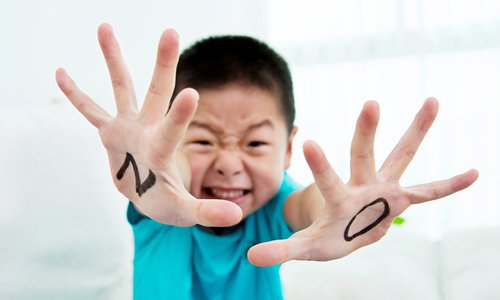HOME >> OPINION
Spanking doesn’t help, learn from France
By Louise Ho Source:Global Times Published: 2019/7/9 20:13:41

Photo: VCG
Lawmakers in France passed a bill on July 2 banning corporal punishment to children at home, making France the 55th country to outlaw child spanking.
French parents are known for a liberal style of parenting. They don't force children to do what they don't like. I was therefore surprised to learn that corporal punishment is quite common in France.
Eighty-five percent of French parents admitted to hitting their children, according to a survey released in 2018 by Childhood Foundation, a charity in France. The survey also says 75 percent of physical punishment led to child abuse.
At the weekend, I saw a French father beating his boy at an outdoor food market in central Paris. The punishment seemed to work as the boy immediately went quiet.
"La fessée" or spanking is part of French culture. French children know that they are expected to get la fessée from their parents when they are naughty.
French parents are hardly the only ones to take to corporal punishment to discipline children.
Statistics published by UNESCO in November 2017 show 1.1 billion parents consider physical punishment necessary in child education.
Physically disciplining children as a necessary part of child education is deeply embedded in the mind-set of many Chinese people. Various Chinese proverbs say that hitting children is good for them, as goes the Western proverb - "spare the rod, spoil the child."
Research by education and legal experts in 2005 showed two-thirds of children in China were hit by parents, according to a report on people.cn.
Many of the post-1980s generation, including myself, had experienced the rod or spanking by parents during childhood. Using rattans to cane children was once popular in the southern regions of China.
But unlike the Chinese style of corporal punishment, in which the harder the child is hit the better, the French la fessée does not aim to hurt. It acts as a deterrent by creating fear.
Nowadays in China or France, fewer younger parents born in the 80s or 90s resort to corporal punishment. Our society has become less tolerant of smacking children after many horrible stories of abuse emerged.
As a parent of a toddler myself, I agree physical disciplining can lead to immediate compliance. But research shows children who are subjected to beatings have an aggressive temperament and are more likely to develop mental health problems.
Some people have criticized the French legislation as lacking teeth as it does not include punishment for parents who violate the law. It is also difficult to implement the law as it is harder to monitor homes than schools.
But at least in the short term, the law can make parents think twice before they wield the stick. In the long term, the law can encourage parents to change the way they educate their children.
Right now corporal punishment at home is not illegal in China, although parents will be stripped of guardianship if there is continued assault that seriously damages a child's mental and physical health.
A mother of two young children in her mid-30s in Shanghai told me that she would support a ban on corporal punishment in China. "There should be laws to list the level of abuse," she said.
As society evolves, laws are meant to change. French parents were allowed to use corporal punishment to discipline children under Napoleon as early as the 1800s. Therefore, the latest move by the French parliament is a watershed.
The government in Japan, where corporal punishment is common, is also mulling a ban on spanking at home. If passed, the legislation will go into effect in April 2020.
There are more countries in the world that allow child beating at home than those that do not. It's time China took the cue from France to consider banning corporal punishment at home.
The author is a freelance journalist based in Paris. opinion@globaltimes.com.cn
RELATED ARTICLES:
Posted in: VIEWPOINT